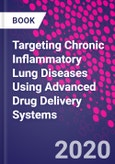Targeting Chronic Inflammatory Lung Diseases Using Advanced Drug Delivery Systems explores the development of novel therapeutics and diagnostics to improve pulmonary disease management, looking down to the nanoscale level for an efficient system of targeting and managing respiratory disease. The book examines numerous nanoparticle-based drug systems such as nanocrystals, dendrimers, polymeric micelles, protein-based, carbon nanotube, and liposomes that can offer advantages over traditional drug delivery systems. Starting with a brief introduction on different types of nanoparticles in respiratory disease conditions, the book then focuses on current trends in disease pathology that use different in vitro and in vivo models.
The comprehensive resource is designed for those new to the field and to specialized scientists and researchers involved in pulmonary research and drug development.
Please Note: This is an On Demand product, delivery may take up to 11 working days after payment has been received.
Table of Contents
1. Chronic respiratory diseases: An introduction and need for novel drug delivery approaches2. Drug delivery of respiratory medicines in practice3. Advanced drug delivery systems for respiratory diseases4. Novel drug delivery systems and significance in respiratory diseases5. Use of biologics in the treatment of asthma, COPD, ACOS, and idiopathic pulmonary fibrosis6. Targeting biofilms in chronic respiratory infections using drug delivery systems7. Absorption enhancement of macromolecule administered intrapulmonary8. In silico analysis of drug delivery in respiratory disease9. Concepts of nanotechnology in nanomedicine: From discovery to applications10. Advancement in translational respiratory research using nanotechnology 11. Nanoparticle-based macromolecule drug delivery to lungs12. Formulation and role of polymeric and inorganic nanoparticles in respiratory diseases13. Inhalable hybrid nanocarriers for respiratory disorders14. Functionalized nanoparticles in pulmonary disease diagnosis15. Drug delivery system in pulmonary disease: Role of microparticles16. Microparticulate drug delivery systems for targeting respiratory diseases17. Porous particulate platforms for enhanced pulmonary delivery of bioactives18. Liposomes in the treatment of chronic respiratory conditions19. Theranostic drug delivery systems for targeted therapy of lung diseases20. Targeted polymeric miceller systems for respiratory diseases21. Hydrogels for pulmonary drug delivery22. Mucoadhesive drug delivery systems in respiratory diseases23. Targeting lung cancer using advanced drug delivery systems24. Plant-based drug delivery systems in respiratory diseases25. Role of essential oils in respiratory diseases through advanced and nanodrug delivery systems26. Pharmacokinetics and pharmacodynamics of the advanced drug delivery systems
Authors
Kamal Dua Senior Lecturer, Discipline of Pharmacy, Graduate School of Health, University of Technology Sydney, Sydney, NSW, Australia.Dr. Kamal Dua is a Senior Lecturer in the Discipline of Pharmacy at the Graduate School of Health, University of Technology Sydney (UTS), Australia. He has research experience of over many years in the field of drug delivery systems targeting inflammatory diseases. Dr. Dua researches in two complementary areas; drug delivery and immunology, specifically addressing how these disciplines can advance one another, helping the community to live longer and healthier. This is evidenced by his extensive publication record in reputed journals. Dr. Dua's research interests focus on harnessing the pharmaceutical potential of modulating critical regulators such as Interleukins and microRNAs and developing new and effective drug delivery formulations for the management of chronic airway diseases. He has published more than 80 research articles in peer-reviewed international journals and authored or co-authored four books. He is an active member of many national and international professional societies.
Philip M. Hansbro Centre for Inflammation, Centenary Institute and University of Technology Sydney, Sydney, NSW, Australia. Centre for Inflammation, Centenary Institute and University of Technology Sydney, Faculty of Science,Sydney, NSW, Australia Ridhima Wadhwa Discipline of Pharmacy, Graduate School of Health, University of Technology Sydney, Sydney, NSW, Australia. Discipline of Pharmacy, Graduate School of Health, University of Technology Sydney, Australia Mehra Haghi Discipline of Pharmacy, Graduate School of Health, University of Technology Sydney, Sydney, NSW, Australia. Discipline of Pharmacy, Graduate School of Health, University of Technology Sydney, Australia Lisa G. Pont Discipline of Pharmacy, Graduate School of Health, University of Technology Sydney, Sydney, NSW, Australia. Lisa G. Pont is a Professor in the Discipline of Pharmacy, Graduate School of Health at the University of Technology Sydney. Pont is a pharmacoepidemiologist with expertise in medicine utilization and health service research to evaluate, understand, and improve the quality and safety of medicine use in practice. Her research explores current practices and patterns of medicines use across populations with a focus on the safety and quality of prescribing and medicines use. Throughout her career, Professor Pont has received a number of awards including two national NPS MedicineWise awards in 2014 and in 2016 for her research. She is a registered pharmacist and was awarded the Society of Hospital Pharmacist of Australia Medal of Merit in 2018. Kylie A. Williams Discipline of Pharmacy, Graduate School of Health, University of Technology Sydney, Sydney, NSW, Australia. Kylie A. Williams is a pharmacist and academic leader. She is a founding member of the Graduate School of Health at University of Technology Sydney (UTS), where she is currently the Head of Pharmacy and the Deputy Head of School Learning & Teaching. She has over 25 years of academic experience in learning and teaching, curricula development, research, and academic leadership. Professor Williams leads a research team focused on development, implementation, and evaluation of new models of pharmacy and health service delivery. Alongside her research expertise, Professor Williams is internationally recognized for her curriculum development, and has received a number of teaching grants and awards and has coauthored numerous teaching-related peer-reviewed journal articles, professional books, and educational articles for pharmacists.








